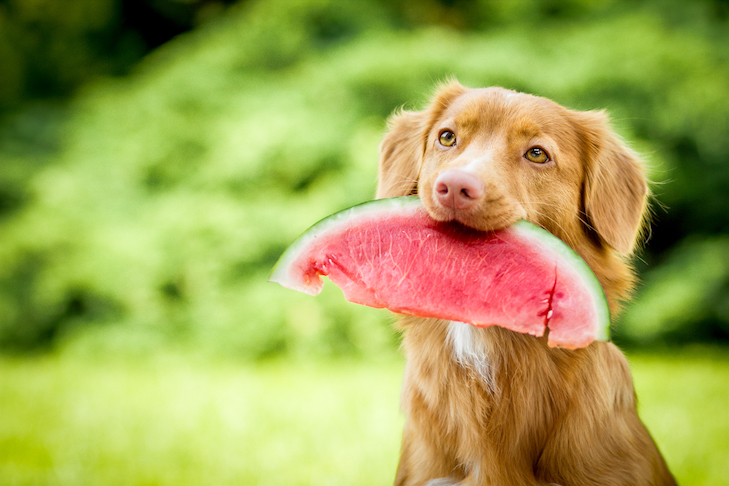Can Dogs Have Watermelon A Refreshing Treat or Hidden Danger
Proper nutrition is paramount for our beloved canine companions, and as responsible pet owners, we often seek guidance on what’s safe for them to eat. One question that frequently arises during the summer months is, “Can dogs have watermelon?” In this comprehensive guide, we’ll delve into the safety, benefits, and potential risks of offering your furry friend this juicy fruit.

Is Watermelon Safe for Dogs?
Nourishment or No-Go: The Safety of Feeding Watermelon to Dogs
It’s only natural to want to share a sweet, hydrating treat like watermelon with your canine companion. Let’s explore whether this popular summer fruit is a safe choice:
Can Dogs Eat Watermelon?
Watermelon itself is non-toxic to dogs and can be a refreshing addition to their diet.
Potential Benefits:
Watermelon is primarily composed of water, making it a hydrating option. It also contains essential vitamins, like vitamins A and C, which can be beneficial for dogs in moderation.
Portion Control is Key:
While watermelon can be safe, moderation is crucial. Too much of this high-sugar fruit can lead to digestive upset.
Nutritional Value of Watermelon
Exploring the Canine Delight: Watermelon’s Nutritional Bounty
Understanding what watermelon brings to the doggy table can help you make informed choices about its inclusion in their diet:
Hydration Powerhouse:
Watermelon’s high water content makes it an excellent hydrating option for dogs, especially during hot weather.
Vitamins and Antioxidants:
This fruit packs a nutritional punch with vitamins A, B6, and C, along with beneficial antioxidants.
Fiber and Low Calories:
Watermelon is low in calories and contains dietary fiber, which can be helpful for digestion.
Safe Ways to Feed Watermelon to Dogs
Serving Up Summer Delight: Responsible Ways to Offer Watermelon
If you’ve decided that your canine friend can enjoy some watermelon, here are safe and responsible ways to serve it:
Remove Seeds:
Ensure you remove all seeds and pits from the watermelon slices before sharing them with your dog. Seeds can be a choking hazard.
Watch for Rind:
While the flesh of watermelon is safe for dogs, the rind can be difficult to digest and may lead to digestive discomfort. Stick to the juicy, seedless parts.
Portion Control:
Remember, moderation is key. Treat watermelon as an occasional snack, not a meal replacement. Small, bite-sized pieces are ideal.
First-Time Introduction:
If your dog has never tried watermelon before, start with a small amount to gauge their reaction and any potential sensitivities.
Potential Risks and Allergies
Unraveling the Risks: What to Be Cautious About
While watermelon can offer health benefits, there are potential risks and allergic reactions to consider:
Sugar Content:
The high sugar content in watermelon means it should be an occasional treat, especially for dogs with weight or diabetic concerns.
Allergic Reactions:
Just like humans, dogs can have allergies. Watch for signs of allergic reactions, such as itching, hives, or digestive issues, after introducing watermelon.
Digestive Sensitivities:
Some dogs may experience digestive discomfort, including diarrhea if they consume too much watermelon or its rind.
Symptoms of Watermelon Allergies or Reactions
Navigating Allergic Reactions: Signs to Watch For
Pet owners must recognize the symptoms of potential watermelon allergies or adverse reactions in their dogs:
Itching and Skin Irritation:
Persistent scratching, redness, or hives on the skin can be indicators of an allergic response.
Digestive Distress:
Watch for symptoms like diarrhea, vomiting, or abdominal discomfort after consuming watermelon.
Breathing Issues:
In severe cases, dogs may exhibit difficulty breathing or swelling in the face. This requires immediate veterinary attention.
Monitoring Your Dog
Keeping a Close Eye: The Importance of Observation
After introducing watermelon into your dog’s diet, it’s essential to be vigilant and monitor their response:
Regular Observation:
Pay attention to your dog’s behavior, stools, and any signs of discomfort or unusual reactions in the hours following watermelon consumption.
Consult Your Veterinarian:
If you notice any concerning symptoms, don’t hesitate to consult your veterinarian for guidance and evaluation.
Moderation is Key:
Continue offering watermelon in moderation to ensure your dog’s safety and well-being.
Alternatives to Watermelon
Exploring Other Canine-Friendly Treats
If you decide that watermelon isn’t the right choice for your dog, there are plenty of other safe and nutritious alternatives to consider:
Apples (Without Seeds):
Apples, minus the seeds, can be a crunchy and vitamin-rich treat.
Carrots:
Carrot sticks are low in calories and high in fiber, making them a great option for dogs.
Blueberries:
These little powerhouses are packed with antioxidants and can be a delightful, low-calorie snack.
Dog-Specific Treats:
Explore commercial dog treats specifically designed to meet your pet’s nutritional needs.
Frequently Asked Questions (FAQs) about Dogs and Watermelon
1. Q: Can dogs eat watermelon safely?
Yes, dogs can eat watermelon safely when served in moderation and without seeds or rind.
2. Q: What are the potential benefits of feeding watermelon to dogs?
Watermelon is hydrating and contains vitamins A, B6, and C, along with antioxidants, which can be beneficial for dogs in moderation.
3. Q: Can puppies eat watermelon?
Yes, puppies can enjoy watermelon, but it’s crucial to introduce new foods gradually and monitor their response.
4. Q: Are there any risks associated with giving dogs watermelon?
Risks include digestive discomfort if dogs consume too much or ingest seeds or rinds. High sugar content can also be a concern for some dogs.
5. Q: Can watermelon cause allergies in dogs?
While rare, some dogs may have allergies to watermelon. Watch for signs of itching, hives, or digestive issues after feeding.
6. Q: How much watermelon can I give my dog?
Offer small, bite-sized pieces as an occasional treat, not a meal replacement. Portion control is essential.
7. Q: Should I remove seeds and rind from a watermelon before giving it to my dog?
Yes, it’s crucial to remove all seeds and the tough rind before serving watermelon to dogs to prevent choking and digestive issues.
8. Q: Can watermelon lead to weight gain in dogs?
Watermelon is low in calories, but excessive consumption can contribute to weight gain. Offer it in moderation.
9. Q: What should I do if my dog has an adverse reaction to watermelon?
If you notice any concerning symptoms like vomiting, diarrhea, or allergic reactions, consult your veterinarian immediately.
10. Q: What are some alternative fruits and treats for dogs if they can’t have watermelon?
Safe alternatives include apples (seedless), carrots, blueberries, and commercial dog-specific treats.
Conclusion:
In conclusion, watermelon can be a refreshing and nutritious treat for dogs when served in moderation and with responsible precautions. It offers hydration, vitamins, and a delightful flavor, making it a summertime favorite for many pet owners and their furry friends. However, always exercise caution, watch for allergic reactions or digestive sensitivities, and consult your veterinarian if you have any concerns. Remember that every dog is unique, so tailor their treats accordingly.




